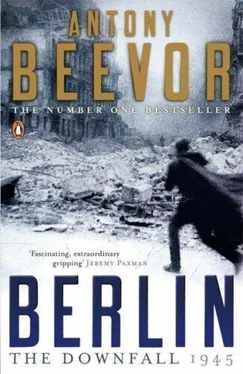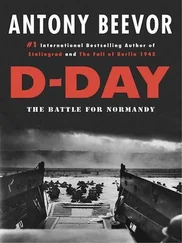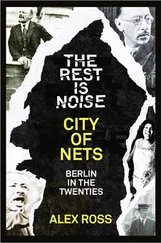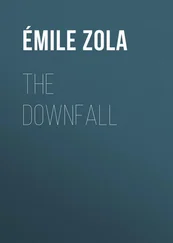I am profoundly grateful to Professor Michael Burleigh, Professor Norman Davies and Dr Catherine Merridale for reading all or parts of the typescript and making very useful criticisms. Tony Le Tissier was also most generous in his detailed observations. Any mistakes which remain are, of course, entirely my responsibility.
I cannot thank Mark Le Fanu and the Society of Authors enough for recovering the websites antonybeevor.com, antonybeevor.org and antonybeevor.net from a cybersquatter. These can now be used to provide an ‘author’s cut’ — a writer’s answer to the director’s cut — thus making available archival and other material for which there was no room in the published version of the book.
I owe, as always, a huge debt to my agent Andrew Nurnberg and to Eleo Gordon, my editor at Penguin, both of whom pushed an initially reluctant author down this route. Once again my wife, writing partner and editor of first resort, Artemis Cooper, has had to put up with constant absences and many extra burdens. I am eternally grateful.
1. Berlin in the New Year
Berliners, gaunt from short rations and stress, had little to celebrate at Christmas in 1944. Much of the capital of the Reich had been reduced to rubble by bombing raids. The Berlin talent for black jokes had turned to gallows humour. The quip of that unfestive season was, ‘Be practical: give a coffin.’
The mood in Germany had changed exactly two years before. Rumours had begun to circulate just before Christmas 1942 that General Paulus’s Sixth Army had been encircled on the Volga by the Red Army. The Nazi regime found it hard to admit that the largest formation in the whole of the Wehrmacht was doomed to annihilation in the ruins of Stalingrad and in the frozen steppe outside. To prepare the country for bad news, Joseph Goebbels, the Reichsminister for Propaganda and Enlightenment, had announced a ‘German Christmas’, which in National Socialist terms meant austerity and ideological determination, not candles and pine wreathes and singing ‘ Stille Nacht, Heilige Nacht’. By 1944, the traditional roast goose had become a distant memory.
In streets where the façade of a house had collapsed, pictures could still be seen hanging on the walls of what had been a sitting room or bedroom. The actress Hildegard Knef gazed at a piano left exposed on the remnants of a floor. Nobody could get to it, and she wondered how long it would be before it tumbled down to join the rubble below. Messages from families were scrawled on gutted buildings to tell a son returning from the front that they were all right and staying elsewhere. Nazi Party notices warned, ‘Looters will be punished with death!’
Air raids were so frequent, with the British by night and the Americans by day, that Berliners felt that they spent more time in cellars and air-raid shelters than in their own beds. The lack of sleep contributed to the strange mixture of suppressed hysteria and fatalism. Far fewer people seemed to worry about being denounced to the Gestapo for defeatism, as the rash of jokes indicated. The ubiquitous initials LSR for Luftschutzraum, or air-raid shelter, were said to stand for ‘ Lernt schnell Russisc’: ‘Learn Russian quickly’. Most Berliners had entirely dropped the ‘Heil Hitler!’ greeting. When Lothar Loewe, a Hitler Youth who had been away from the city, used it on entering a shop, everyone turned and stared at him. It was the last time he uttered the words when not on duty. Loewe found that the most common greeting had become ‘Bleib übrig!’ — ‘Survive!’
The humour also reflected the grotesque, sometimes surreal, images of the time. The largest air-raid construction in Berlin was the Zoo bunker, a vast ferro-concrete fortress of the totalitarian age, with flak batteries on the roof and huge shelters below, into which crowds of Berliners packed when the sirens sounded. The diarist Ursula von Kardorff described it as ‘like a stage-set for the prison scene in Fidelio’ Meanwhile, loving couples embraced on concrete spiral staircases as if taking part in a ‘travesty of a fancy-dress ball’.
There was a pervasive atmosphere of impending downfall in personal lives as much as in the nation’s existence. People spent their money recklessly, half-assuming that it would soon be worthless. And there were stories, although hard to confirm, of girls and young women coupling with strangers in dark corners around the Zoo station and in the Tiergarten. The desire to dispense with innocence is said to have become even more desperate later as the Red Army approached Berlin.
The air-raid shelters themselves, lit with blue lights, could indeed provide a foretaste of claustrophobic hell, as people pushed in bundled in their warmest clothes and carrying small cardboard suitcases containing sandwiches and thermos. In theory, all basic needs were catered for in the shelters. There was a Sanitätsraum with a nurse, where women could go into labour. Childbirth seemed to be accelerated by the vibrations from bomb explosions, which felt as if they came as much from the centre of the earth as from ground level. The ceilings were painted with luminous paint for the frequent occasions during the air raids when the lights failed, first dimming then flickering off. Water supplies ceased when mains were hit, and the Aborte, or lavatories, soon became disgusting, a real distress for a nation preoccupied with hygiene. Often the lavatories were sealed off by the authorities because there were so many cases of depressed people who, having locked the door, committed suicide.
For a population of around 3 million, Berlin did not have enough shelters, so they were usually overcrowded. In the main corridors, seating halls and bunk rooms, the air was foul from over-use and condensation dripped from the ceilings. The complex of shelters under the Gesundbrunnen U-Bahn station had been designed to take 1,500 people, yet often more than three times that number packed in. Candles were used to measure the diminishing levels of oxygen. When a candle placed on the floor went out, children were picked up and held at shoulder height. When a candle on a chair went out, then the evacuation of the level began. And if a third candle, positioned at about chin level, began to sputter, then the whole bunker was evacuated, however heavy the attack above.
The foreign workers in Berlin, 300,000 strong and identifiable by a letter painted on their clothes to denote their country of origin, were simply forbidden entry to underground bunkers and cellars. This was partly an extension of the Nazi policy to stop them mingling intimately with the German race, but the overriding concern of the authorities was to save the lives of Germans. A forced labourer, particularly an ‘Ostarbeiter’, or eastern worker, most of whom had been rounded up in the Ukraine and Belorussia, was regarded as expendable. Yet many foreign workers, conscripted as well as volunteers, enjoyed a far greater degree of freedom than the unfortunates consigned to camps. Those who worked in armaments factories around the capital, for example, had created their own refuge and Bohemian subculture with newssheets and plays in the depths of the Friedrichstrasse station. Their spirits were rising visibly as the Red Army advanced, while those of their exploiters fell. Most Germans looked on foreign workers with trepidation. They saw them as a Trojan Horse garrison ready to attack and revenge themselves as soon as the enemy armies approached the city.
Berliners suffered from an atavistic and visceral fear of the Slav invader from the east. Fear was easily turned to hate. As the Red Army approached, Goebbels’s propaganda harked on again and again about the atrocities at Nemmersdorf, when Red Army troops had invaded the south-eastern corner of East Prussia the previous autumn and raped and murdered inhabitants of this village.
Читать дальше











